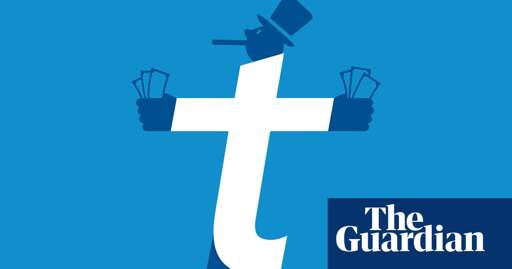You may know the drill. You get online at 10am, several months before the show, and receive a place in the virtual queue. Perhaps you notice with dismay that your number is larger than the capacity of the venue. Perhaps you then lose your place because you’ve been misidentified as a bot, or the site crashes altogether. If you make it to the front, you may well wonder why £100 (plus about £20 in opaque surcharges) now qualifies as a cheap seat. And that’s if there are any cheap seats left, not just inflated VIP packages. And you may ask yourself why it has to be like this.
When you don’t get what you want, you tend to look for someone to blame. That someone is usually Ticketmaster. The company, which merged with concert promoters Live Nation in 2010 to form Live Nation Entertainment, sells about 70% of all concert tickets worldwide, and an even greater proportion of the arena and stadium market. In 2024, Live Nation generated a record $23.2bn (£17.5bn) in revenue, with Ticketmaster selling 637m tickets. Rivals such as See Tickets (owned by Germany’s CTS Eventim) and AXS (the ticketing arm of promoters AEG Presents) aren’t exactly minnows but Ticketmaster has become a synonym for ticketing: a lightning rod and a punchbag.
In the US, Ticketmaster’s current problems stem from a cardinal error: getting on the wrong side of Swifties. In November 2022, the company failed to stagger the presale for Taylor Swift’s Eras tour, listing all 2m tickets simultaneously. The colossal demand overwhelmed the servers, causing myriad problems. Swift expressed her disappointment. Ticketmaster grovelled. Last May, the US justice department (DOJ) filed an antitrust suit, now backed by 39 states, which alleges that Live Nation and Ticketmaster use their “power and influence … to freeze innovation and bend the industry to their own benefit”.



I get that, but my wife and I are huge fans of The Monkees. The only one of the 4 alive is Micky Dolenz, who is still touring at 80 years old. How much longer will he be doing concerts? I don’t want to miss out on seeing him perform when he’s near in what, at any time, could be his last concert just to make a stand against Ticketmaster.
Understand, we don’t go to multiple shows a year, but when there’s something that we really want to see, they’ve got me by the short and curlies. Either pay up or don’t go. There are times when its more important to pay up than to prove a point, but that doesn’t make me hate them any less.
The Prefab four. Who couldn’t play their own instruments until their 4th record. A fool and his money…
Alright now, let’s not get into an argument about The Monkees. In 1967, they outsold both The Beatles and The Rolling Stones, so they’re not nobodies. And just to clear up a few fallacies, Mike was an accomplished guitarist and bassist, Peter could play banjo, bass, and keyboards, and Davy was a drummer. (They didn’t want to put Davy behind the drums because he was short, and they were afraid he wouldn’t be seen.) They were not allowed to play their instruments or even have any input on the songs they recorded on the first two albums by Don Kirshner, the person hired by Colgems as music supervisor for the TV show. It was their 3rd album (not 4th) that they were finally able to get control. The resulting album - Headquarters - Rolling Stone magazine called one of the 500 you should hear before you die. They went on to make six more albums up to 1970 where they had complete control over the songs and played on them. They even had a top 20 album in 2016 on their 50th anniversary called Good Times, with all four members contributing (a previously recorded vocal track by Davy, who was deceased at the time, was digitally cleaned up and put over new music).
Yes, they were the Prefab Four, but Micky likes to use the metaphor that Pinocchio became a real boy. They were put together to act like a band, but they actually became a real band.
Oooh, retirement-age gossip. And debunked gossip at that.